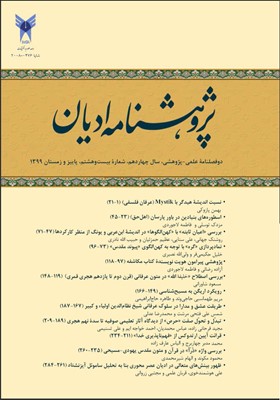نسبت اندیشة هیدگر با Mystik (عرفان فلسفی)
محورهای موضوعی : تصوف
1 - عضو هیئت علمی موسسه پژوهشی حکمت و فلسفة ایران
کلید واژه: وارستگی, عرفان فلسفی, گذاشتن (lassen), وجودگذاشتن (Seinlassen),
چکیده مقاله :
شاید هیچ فیلسوفی در قرن بیستم به اندازة هیدگر سعی نکرده است در اندیشهاش ورای مفاهیم و تأملات فلسفی فرادادی برود. اندیشة هیدگر از دورة مشهور به گشت به بعد وارد ساحتی از تجربة فکری و قلمرو مرزی شده است که ورای تفکری صرفاً عقلانی میرود و از قواعد آن پیروی نمیکند. بسیاری از مفسران این نحوه اندیشیدن را شبیه به نحوة اندیشیدن Mystik تفسیر و در قابلیت آن در پاسخگویی به پرسشهای فلسفی تردید کردهاند. منظور ایشان از Mystik آنگونه تفکری است که زیر بار عقلانیت شانه خالی میکند و عقل بدان راه ندارد. در این نوشته اما منظور از Mystik که ما آنرا به عرفان فلسفی ترجمه کردهایم، جریانی فکری در مسیحیت است که با نام مایستر اکهارت گره خورده است و قلمروة وسیعی از موضوعات را دربر میگیرد که همة آنها لزوماً با فلسفه همسخنی ندارند. در بررسی نسبت اندیشة هیدگر با عرفان فلسفی نخست گزارشی از موضع خود او در قبال این مفهوم داده میشود. در قدم بعدی، برای اینکه معلوم شود که اندیشة هیدگر تا چه حد به عرفان فلسفی نزدیک است در مقایسهای وجوه افتراق و اشتراک معانی مفهوم وارستگی نزد اکهارت و هیدگر را نشان میدهیم.
In the twentieth century has no philosopher tried as much as Heidegger to go beyond philosophical concepts and reflections. From the period known as the "Kehre", Heidegger's thought has entered into a field of intellectual experience and a borderline realm that goes beyond purely rational thought and does not follow its rules. Many commentators have interpreted this way of thinking as similar to the way of Mystik thinking and doubt its ability to answer philosophical questions. By Mystik they mean a kind of thinking that shrugs off the burden of rationality and reason has no access to it. In this article, however, Mystik, that means "philosophical mysticism", is a school of thinking in Christianity that is tied to the name of Meister Eckhart. It covers a wide range of subjects, not all of which necessarily agree with philosophy. In examining the relation of Heidegger's thought to "philosophical mysticism", a report is first given of his own position on this concept. In the next step, in order to find out how close Heidegger's thought is to "philosophical mysticism", we show, in comparing the differences and common aspects of the meanings of both Eckhart's and Heidegger's concept of "releasement (Gelassenheit)".
Heidegger, Martin, Was ist Metaphysik? Frankfurt a. M., 1955.
Idem, Nietzsche. Band II, Pfullingen, 3. Auflage, 1961.
Idem, Frühe Schriften. Gesamtausgabe Band 1, Frankfurt a. M., 1978.
Idem, Aus der Erfahrung des Denkens. Gesammtausgabe Band 13, Frankfurt a. M, 1983.
Idem, "Europa und die deutsche Philosophie", Europa und die Philosophie. Hrsg. von H.-H. Gander, Schriften der Heidegger-Gesellschaft 2, Frankfurt a. M., 1993.
Idem, Zollikoner Seminare. Frankfurt a. M., 1994.
Idem, Phänomenologie des religiösen Lebens, Gesamtausgabe Band 60, Frankfurt a. M., 1996.
Idem, Besinnung (1938/39), Gesamtausgabe Band 66, Frankfurt a. M., 1997.
Idem, Der Satz vom Grund, Gesamtausgabe Band 10, Frankfurt a. M., 1997.
Idem, Reden und andere Zeugnisse eines Lebensweges 1910-1976, Gesammtausgabe Band 16, Frankfurt a. M., 2000.
Idem, Vorträge und Aufsätze, Gesammtausgabe Band 7, Frankfurt a. M., 2000.
Idem, Zur Sache des Denkens, Gesammtausgabe Band 14, Frankfurt a. M., 2007.
Meister Eckhart, Deutsche Predikten und Traktaten, Hrsg. und übrs. von J. Quint. Zürich, 1979.
Idem, Die deutsche Werke, Hrsg. u. übrs. von J. Quint. Bd. 1, Stuttgart, 1936.
Idem, Die deutsche Werke, Hrsg. u. übrs. von J. Quint. Bd. 5, Stuttgart, 1936.
Idem, Predikten und Traktaten, Hrsg. u. übrs. von Franz Pfeiffer, Aalen, 1962.
Koloczek, Lukasz, "Ist die Heideggersche Philosophie des Seyns Mystik?", Argument, vol.7, I.2, 2017, pp. 311-331.
Schürmann, Reiner, "Heidegger and Meister Eckhart on Releasment", Research in Phenomenology, vol.3, I.1, 1973, pp. 95-119.
Von Herrmann, F.W., "Gelassenheit" bei Heidegger und Meister Eckhart. In: Babich, B. E. (eds.): From Phenomenology to Thought, Errancy, and Desire. Dordrecht, 1995, pp. 115-127.
Wolz-Gottwald, Eckard, "Martin Heidegger und die philosophische Mystik", Philosophisches Jahrbuch, Bd. 104, 1997, S. 64-79.
_||_
